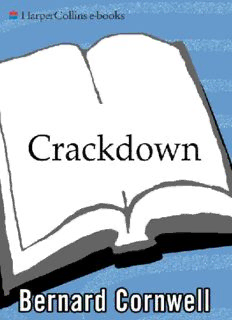
Crackdown aka Murder Cay PDF
Preview Crackdown aka Murder Cay
C RACKDOWN A Novel of Suspense BERNARD CORNWELL Acknowledgements and Dedication It is usual, and prudent, to claim that no characters in any novel are based on real people, which claim is certainly true of the characters in Crackdown, yet the fictional island of Murder Cay is based on the all too real Bahamian island of Norman’s Cay, and for details of that island, as well as for much other information about the narcotrafic- antes, I am indebted to the book The Cocaine Wars by Paul Eddy, Hugo Sabogal and Sara Walden. I must also acknowledge my extreme debt to Dr Laura Reid, erstwhile Medical Director of the Gosnold Treatment Center in Fal- mouth, Cape Cod, who educated me about cocaine, and about the difficulties faced by her patients who are trying to break their cocaine addictions. It seems to me that the true warriors of the drug war are people like Laura Reid and her colleagues whose battles and victories are rarely headlined. To them, and to all their patients who have defeated the evil, Crackdown is respectfully dedicated. Contents Acknowledgements and Dedication ii Part One 1 Part Two 105 Part Three 191 Part Four 267 About the Author Other Books by Bernard Cornwell Cover Copyright About the Publisher PART ONE Y ou cannot cheat death. It is not an illusion. It does not melt into air, into thin air, it is instead a clumsy thing of the night, to be dis- covered in the dawn. And it was in the dawn, in a gentle Bahamian dawn, that I dis- covered Hirondelle. She had been a cruising yacht; a pretty thirty-eight-foot fibreglass sloop. She had been a graceful thing, and she had been butchered. When I found Hirondelle she was nothing but a barely floating derelict, so low in the water that I might have missed her altogether except that a heave of her sluggish hull flashed a reflection of the sun’s new wan light from a polished deck-fitting into my eyes. I was so tired that I almost took no notice, assuming that the scrap of light had been mirrored from a discarded and floating beer can, but something made me pick up my binoculars and there she was; a dead creature which rolled under the blows of the short dawn chop. I could see no one aboard the rolling hull. Her apparent abandon- ment, together with my weariness, tempted me to ease my helm to starboard and thus slip past the stricken boat that, like any other piece of floating junk, would have been out of sight within moments, and forgotten within hours, but curiosity and my sense of duty would not let me ignore her. There was still a slight chance that a wounded mariner was aboard, and so the wave-drenched wreck had to be boarded. At least the weather was being kind. There was no steep chop or gusting wind to make boarding the waterlogged hull difficult. In- stead the dawn was a calm, lovely finish to what had been a perfect tropical night during which I had been reaching northwards with every sail set; jib, staysail, foresail, mainsail and both jackyard top- sails. Wavebreaker must have looked unutterably beautiful in that ghostly sunrise until the moment when I ran her head into wind and pressed the buttons which controlled the electric motors that furled her sails. I still found it odd to be sailing a boat on which everything was mechanised, electrified or computerised 3 because by inclination and income I was a sailor of simpler tastes, but for the present I was Wavebreaker’s hired skipper, and Wavebreaker was a luxury charter schooner, and the kind of people who rented her expected to find her loaded down with as many gadgets as a space shuttle. We had no charterers aboard on the morning I discovered Hirondelle. Instead we had been ‘dead-heading’, meaning that Wavebreaker sailed with only her crew aboard. The three of us had just spent four weeks off the western coast of Andros where Wavebreaker had been hired to make a television commercial for cat food. The notion of the commercial had been that an extremely wealthy cat had chartered the schooner to search the world’s oceans for the best-tasting fish, only to discover that Pussy-Cute Cat Food had already caught and canned the taste. The commercial must have cost Pussy-Cute millions of dollars, and Wavebreaker had been overrun with camera crews, designers, visualisers, scriptwriters, cat-handlers, fish-handlers, directors, account executives, make-up girls, hairdressers, line-producers, assistant-producers, real produ- cers, as well as all the girlfriends and boyfriends and hermaphrodite- friends of everyone involved. Serious adults had argued passionately about the motivation of the rich cat, and even I, who had thought myself immune to the insanities of the film world, had been aston- ished when an elderly actor had been specially flown down from New York to imitate the beast’s miaow because the real thing had not been considered sufficiently authentic. The elderly actor, coming aboard Wavebreaker for the first time, had stared at me in astonish- ment; then, though he had never seen me in his life before, he spread his arms in familiar and lavish welcome. “Sweet Tom!” He had called me by my father’s name, and I had smiled wanly, then confessed that I was indeed Tom Breakspear’s son. “How could you not be?” the New York actor had demanded. “You’re the very image of him! Will you remember me to the old rascal?” Everyone knew my father. Everyone wanted me to know how they just loved my father. Everyone told me just how like my father I looked, though very few dared ask me from which of my father’s wives I had been whelped. 4
